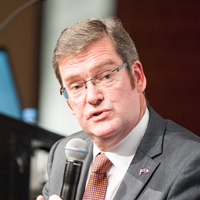Explore our Climate and Energy Hub
29/04/2013
 |
|
 |
|
.jpg) |
Australian agriculture must embrace foreign investment to develop irrigation areas and to produce higher value products for consumers, a CEDA forum in Brisbane has been told.
Speakers including Minister for Agriculture, Fisheries and Forestry, Dr John McVeigh, Director of Qatar-owned agricultural company Hassad Australia, John Corbett, and Executive Director of the Australian Bureau of Agricultural and Resource Economics and Sciences, Paul Morris, said foreign investment and transformation would be needed to enable Australian agriculture to compete internationally.
The forum heard:
- While Australia had a competitive advantage in biosecurity or disease-free production, the strong $A and increasingly high costs meant producers would need to focus on value adding rather than supplying commodities.
- Prices for beef and grain are likely to come under pressure as supply increased in the Black Sea region, Latin America and India.
- Demand from developed countries would remain soft with growth in developed countries picking up to only two per cent out to 2018.
- Demand for food, particularly meat, vegetables and dairy products, would be driven by Asian countries, accounting for 72 per cent of the 75 per cent projected global increase in food demand. China would account for 40 per cent of this projected increase.
- Australia's gross production (in real terms) over the next three years is estimated to be around $50 billion for agriculture, fisheries and forestry - about four per cent lower than the previous 10 year average.
Mr Morris said the Australian farming sector could not afford to simply continue to do what it had been doing for the past 50 years.
"What we need to do, going out to 2050, is look at the types of products we are producing and see whether we can compete in the commodity market with these guys (new low cost producers) or look at higher value added products to meet consumer demand," he said.
Industry would need to "embrace foreign investment" to increase research and development, innovation and intensity, he said.
"Producers need to be looking down the value chain at what consumers actually want," he said.
Dr John McVeigh said the Queensland Government's agriculture vision for 2040, to be released over the next few weeks, would outline how the State would reach its target of doubling the income from agriculture, fisheries and forestry from $14.7 billion in 2012-13.
Federal and state governments would have an important role in ensuring market access for Australian agricultural suppliers and in R&D collaboration to improve Australia's competitiveness, particularly in the production of beef, sugar, grains and pulses, Dr McVeigh said.
Significant policy work would also need to be done to reverse the damage to Australia's beef export market in Indonesia following the live cattle ban, he said.
"Biosecurity (is) one of the features of the Australian agriculture picture that attracts foreign investment - I think we need to do better. I think we do well but we need to do better - and so it goes for our infrastructure and so it goes for our market access and other initiatives," he said.
The Queensland Government would also focus on identifying new agricultural precincts and developing the northern irrigation strategy using unallocated water from the Flinders and Gilbert River catchments, he said.
Mr Corbett said that while a recent study found another 20 million hectares could be irrigated for cropping in Australia, around $200 billion was needed for the development.
Much of this would need to come from foreign investors, he said.
Foreign investment in Australian agriculture had remained steady at around 20 per cent of Australian land over the past 90 years, with most recent investment focused on the upstream sectors such as grain storage and trading, he said.
Australia was relatively open to foreign investment in the agricultural sector and its strong regulatory system was an advantage for companies such as Hassad which had sought to develop a diversified production base to guarantee customers' continuity of supply.
"We are actually very, very comfortable with the FIRB (Foreign Investment Review Board) process - it provides a very well established process around how we actually go about our investment," he said.
"We maintain a very regular and open communication with FIRB, communicating our business plan, communicating our community engagement and employment processes.
"FIRB is very much across what we are doing out there in rural and regional Australia.
"We put an emphasis on commercial returns - we're not out there buying land at any price.
"Why would we want to be pushing up the price of land? It's very much against our philosophy which is to generate a commercial rate of return."
Discussion of issues in the agriculture sector and for regional economies continues at CEDA's annual Queensland Economic Development Forum on Wednesday 24 July. Register now.
